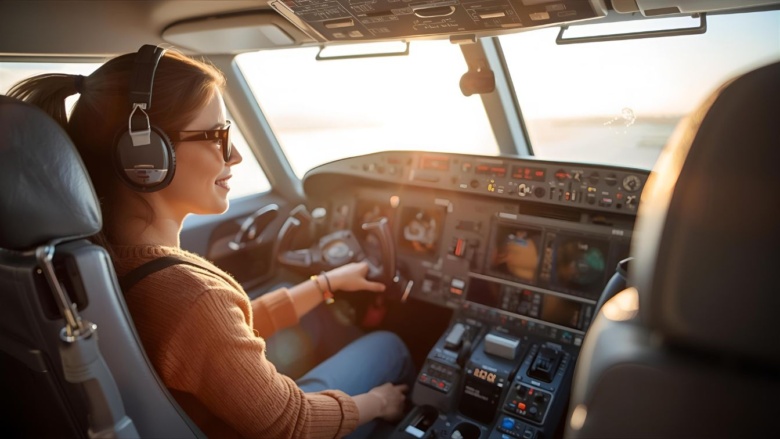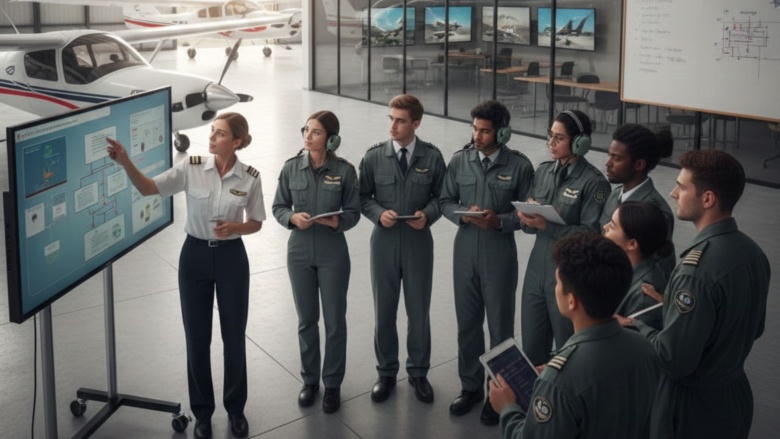Aviation has always captured the attention of those who dream big and aim high. Choosing to train as a commercial or private pilot is more than a career decision; it’s a commitment to discipline, responsibility and continuous learning. If you’re thinking about joining a pilot school or have been searching for a flight school near me, this blog lays out everything you need to know before taking off on your journey. Let’s break down the essential requirements that aspiring pilots must meet to start their pilot flying training.
Educational Qualifications: Starting with the Basics
To enrol in any DGCA approved flying school, the minimum educational requirement is passing Class 12 with Physics and Mathematics. Students from any recognised board, CBSE, ICSE or State boards, are eligible, provided they meet this criterion.
If you didn’t study Physics and Maths in 10+2, don’t worry. You can complete these subjects through the National Institute of Open Schooling (NIOS) before applying to a flight school.
Candidates must provide their original mark sheets and certificates during admission.
This foundation is vital because aviation theory and calculations heavily rely on physics principles and numerical reasoning.
Age Criteria: When Can You Start Flying?
The Directorate General of Civil Aviation (DGCA) mandates a minimum age of 17 years to begin flying lessons. To obtain a pilot license, you must be at least 18 years old. The upper age limit is generally flexible, especially for private pilot training, but commercial pilot training is often pursued early for better career prospects.
Medical Fitness: Class 2 and Class 1 Medicals
No matter how good you are with books or simulators, flying an aircraft demands physical and mental fitness.
- For initial admission to a pilot training institute in Ahmedabad or elsewhere, a DGCA Class 2 Medical Certificate is sufficient.
- Before flying solo or advancing in training, a DGCA Class 1 Medical Certificate becomes mandatory.
These evaluations are conducted by DGCA-approved medical examiners and test your eyesight, hearing, blood pressure, ECG and overall physical health. It’s wise to undergo the Class 2 check-up before joining any aviation academy.
Proficiency in English: Aviation’s Global Language
The medium of instruction at any reputed aviation training institute is English. Hence, the DGCA requires all aspiring pilots to have a reasonable command over spoken and written English. Communication is key in aviation, especially when coordinating with Air Traffic Control (ATC), following radio protocols and understanding flight manuals. If you’re not confident, investing time in improving English communication can significantly boost your training experience.
Passion Meets Patience: Mental Readiness
Learning to fly is rigorous. It’s not just about cockpit hours but also long hours of theoretical training, simulator sessions, weather delays and DGCA exams. This profession demands alertness, attention to detail and quick decision-making under pressure.
Your motivation should go beyond fascination with planes; it should reflect a serious commitment to building a long-term career in aviation. Most flight schools, including those offering pilot training in Ahmedabad, assess this during the counselling or interview process.
Financial Planning: Understanding the Costs
Becoming a pilot is a significant financial investment. The cost of training at a pilot training institute can vary based on the type of license (PPL or CPL), aircraft hours, location and facilities offered.
Here’s what typically adds to the cost:
- Ground school classes
- Flying hours (usually 200 hours for CPL)
- Simulator training
- Study material
- Uniform and kits
- Medical and DGCA exam fees
Before enrolling, it’s important to discuss payment plans, EMI options or educational loans. Many aviation academies are affiliated with banks to help students with structured financial aid.
Choosing the Right Flight School: Go Local, Think Global
Your choice of pilot school can make or break your aviation career. Don’t just search “flight school near me” and go with the first option. Instead, make sure the school is:
- DGCA-approved
- Transparent in its fee structure
- Equipped with well-maintained aircraft and modern simulators
- Staffed with experienced instructors
- Focused on safety protocols and real-time weather training
If you’re looking for professional pilot training in Ahmedabad, INFINIFLY AVIATION ticks all the boxes. The institute offers quality instruction, advanced infrastructure and a focused student-mentor approach, all while being fully DGCA compliant.
What About After Training? Placement Support & Licensing
Once your training is complete, you’ll need to clear written exams and skill checks to earn your pilot license, a Private Pilot License (PPL) or a Commercial Pilot License (CPL), depending on your track.
A reputed pilot training institute helps you prepare for these exams and provides job interview support, resume-building workshops and even placement assistance with charter operators and airlines.
Your Take-off Starts with the Right Groundwork
Getting into aviation is more about building the right foundation from the beginning. Whether you’re just out of school or considering a career switch, meeting the eligibility criteria and choosing a reputable aviation training institute sets you on the right path.
If you’re located in or around Gujarat and wish to become a licensed pilot, your search for a reliable pilot training institute in Ahmedabad ends at INFINIFLY AVIATION. With top-tier faculty, the latest facilities and a student-first approach, we provide you with the support you need to fly confidently toward your goals.




